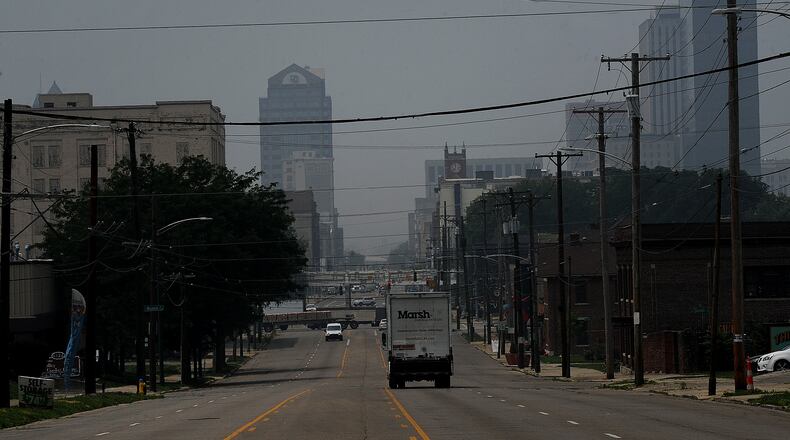The AQI hit new lows Wednesday, and was solidly in the “unhealthy” range Thursday. As of 11:24 am., it was 169 and at 4 p.m. it was 162 due to the fine particulate matter in smoke.
Drifting smoke from the wildfires has lowered curtains of haze on broad swaths of Canada and the U.S., pushing into southern Illinois, Indiana and Ohio, plus parts of West Virginia. Canadian officials say it is the nation’s worst wildfire season ever, and they expect air quality to remain a concern through the summer, the Associated Press reported.
“As long as the fires are burning and the smoke is in the atmosphere, it is going to be a concern not just for Canadians but Americans as well,” said Canadian environment and climate change meteorologist Steven Flisfeder.
Air quality was worse Wednesday than it had been on Tuesday, with morning readings passing the 200 mark into the “very unhealthy” range. At both 10 a.m. and 11 a.m. Wednesday, the AQI in the Miami Valley was 211, then it fell to 194 at noon and 182 by 4 p.m., still at the high end of the “unhealthy” range.
Wednesday’s AQI had been forecast at 130, but air quality from the wildfire smoke can be hard to predict, said Brian Huxtable, pollution control specialist at the Regional Air Pollution Control Agency. Huxtable said the smoke brought down by northerly winds on Tuesday “came in quickly” and caught air monitoring agencies by surprise.
RAPCA, which serves multiple counties in the Miami Valley, said the AQI focuses on health effects people may experience within a few hours or days after breathing polluted air. Any reading of 150 or higher is considered unhealthy for all, while readings between 100 and 150 are still “unhealthy for sensitive groups,” including those with many medical conditions.
Credit: Bill Lackey
Credit: Bill Lackey
Although air quality was unhealthy across the region, local communities did not announce any changes for staff working outside, and there were no immediate reports of cities canceling recreational activities.
“It’s had zero impact,” said Ken Paxson, marketing and communications manager for the Kettering Parks, Recreation & Cultural Arts Department. “Everything is up and operating as usual.”
Smoke from wildfires contains particulates that can be inhaled into the lungs and cause irritation to the eyes, nose or throat, coughing, shortness of breath and chest pain, according to the Ohio Department of Health. It also can aggravate chronic heart and lung conditions.
“It is important to take poor air quality seriously, as exposure to smoke can cause health problems,” said Dr. Bruce Vanderhoff, ODH director. “Certain groups of people are at higher risk, such as those with chronic heart or lung disease, children, the elderly and pregnant women. Please take precautions until these conditions improve.”
As AQI numbers were peaking here in the low 200s Wednesday, Cincinnati and Columbus were a little lower than Dayton (198 and 178), while Indianapolis (238) and Cleveland (276) were notably higher, according to the U.S. Environmental Protection Agency’s AirNow.gov website.
There are 490 fires burning in Canada, with 255 of them considered to be out of control. Quebec’s forest fire prevention agency is reporting 110 active fires.
The Canadian Interagency Forest Fire Centre reported this week that 76,129 square kilometers (29,393 square miles) of forest and other land has burned across Canada since Jan. 1. That exceeds the record set in 1989 of 75,596 square kilometers (29,187 square miles), according to the Canadian National Forestry Database.
“This season has been unprecedented,” Flisfeder said.
How to stay safe
- Limit outdoor activity, especially exercise. Spend more time indoors where you can control the air quality.
- Find a room that can be closed off from outside air. Avoid using candles, gas stoves, wood-burning fireplaces, and aerosol sprays. Smoking and vacuuming can worsen indoor air pollution.
- If you have central air conditioning, use high-efficiency filters to capture smoke particles. Set the system to recirculate mode or close the outdoor intake damper.
- Stay hydrated by drinking plenty of water. If your eyes, nose, or throat are irritated, running a humidifier may offer some relief.
- Remember to check in on those at higher risk and keep a watchful eye on children.
Source: Clark County Combined Health District




